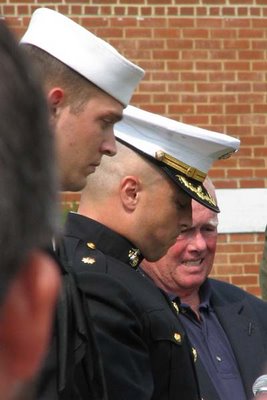
Another season has passed. Summer’s hot, hazy, lazy days are over.
Everything has its season and just as surely as the summer has passed,
Can you identify this antique?
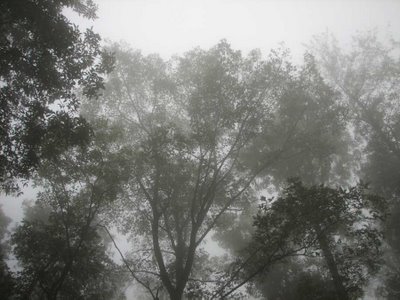

Soon a rod goes down and my son does the honors.
After a battle lasting a few minutes the first fish is on board. Too short! Oh well, splash, maybe we’ll see him again in a couple of years. On my boat we take turns fighting the fish so a couple of fish later it was his turn again but he passed. What's this? Do I see green? Yeah green it is! We have us a case of sea sickness! Out with the pills. Down the hatch. Reassurance that life will get better.
Ok more fish to catch for the old salts. The youngn needs time to recoup, but no problem. He can drive the boat while we fish.
A couple of hours later he is back up, ready to have another go.
Whoa! Now that rod is down big time, drag stripping, get it boy! It’s a biggun! Biggest one today! Maybe biggest one ever! Keep the pressure on! Don’t horse her. Might break the line. Doing good! Keep im coming! Good job! Gosh it gotta be a biggun! Take it easy! Keep the line tight!
With line taunt, muscles bulging, sweat popping, he pulled, he cranked, pulled some more, slowly ever so slowly the great leviathan neared the boat.
Hold the boat straight Paul! Pull up Chad, bring her over the net. A little more. More. There we go, she’s in the net! Wowzer!
The fish didn’t flop, she didn’t ever wiggle, she was totally exhausted! And so was our hero! I ask him to hold her up for a quick pic. No way. Wooped! Totally! Wooped! So I did the best I could, then quickly put her back in the water, held her, revived her, and set her free. I looked around, my young fisherman was eating! Calories, he needed Calories!
They had a good fight. He won! But the best part…………..
They both lived to fight another day!
Note: some photos by Chad Oneil

 In literature we frequently find references to rocks. They are seen as being solid, durable, strong, and impenetrable. In times past rocks were used to build pyramids, fortresses, and many other massive imposing structures. During our Civil War General Thomas J. Jackson earned his name “Stonewall” at the battle of the First Bull Run for standing in the midst of shot and shell unflinching. General George H. Thomas earned the nickname “The Rock of Chickamauga defending Chickamauga Creek in northwestern Georgia.
In literature we frequently find references to rocks. They are seen as being solid, durable, strong, and impenetrable. In times past rocks were used to build pyramids, fortresses, and many other massive imposing structures. During our Civil War General Thomas J. Jackson earned his name “Stonewall” at the battle of the First Bull Run for standing in the midst of shot and shell unflinching. General George H. Thomas earned the nickname “The Rock of Chickamauga defending Chickamauga Creek in northwestern Georgia. 


This is the Cross Roads School house today. It is now used by its present owner as a workshop





Many times down through history there have been watershed events that brought irrevocable change to the lives of the people. The Boston Tea Party, the secession of South Carolina, the assassination of Austrian Archduke Francis Ferdinand, the election of Adolf Hitler just to name a few. September 11th 2001 was one of these events. The world changed that morning, never to return to life as we knew it. Never again will we feel that terrorist acts are something that only happens somewhere else. Never again will hijackers find airline passengers to be passive. Two countries have been invaded. Will we someday look back at this event as the beginning of World War III.
Only the future will tell.
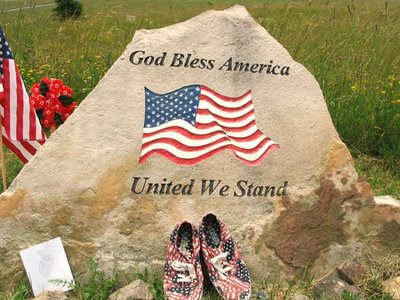
We have visited Shanksville twice since that day. It is nothing spectacular, just a grass covered strip mine. The impact site is beside the grass covered mound in the top photograph. This mound was formed from the material sifted through during the investigation. The small temporary visitor’s center is surrounded by memorials that everyday people have placed there to memorialize their friends, family and fellow countrymen who's lives were given that day. The mood of the visitors is that of reverence. It is the same as one experiences in church, only more so. Everyone speaks in hushed voices, there are no children running and playing, no one laughs, no one calls out to their friends.
All who visit understand the significance of that fateful day and of the good Americans who left this life fighting for what all good Americans believe in.

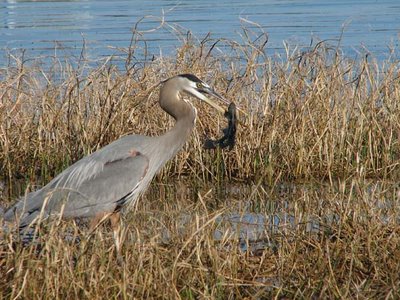
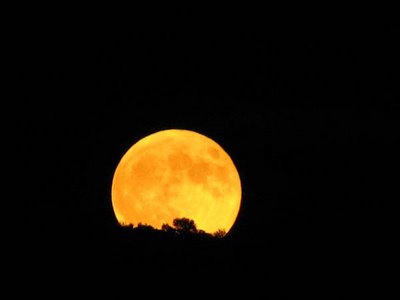
In my youth our family consisted of three generations living under one roof on the family farm. Our farm was consistently behind in technology. Corn was the last harvest of the season and as such it seemed there was no hurry finishing the task.
The process started cutting the corn with a binder pulled behind the Farmall H tractor. The binder tied the corn in small bundles and dropped it on the ground. Once the cutting was done we would pick up these bundles placing a number of them together in a shock. To weather proof the shock it needed to be tied tightly. This was accomplished by wrapping a rope around it and with a person on each end pulling it as snug as possible then wrapping a twine around the tightened shock and securing it. After an appropriate time to dry the shocks were then taken down and each and every ear husk by hand. The ears were then put on a wagon, hauled to the crib and shoveled into it. The corn fodder (stalks) were retied into bundles and set up into shocks to be fed to the cattle during the cold days of winter.
One of grandpa’s hobbies was growing watermelons. He grew some of the largest, sweetest watermelons for miles around. Late each summer many friends and relatives would come for a Sunday afternoon visit and watermelon feast. As the threat of frost would near Grandpa would pick the remaining watermelons and place them in the corn shocks through out the field. Of course he couldn’t remember which shocks contained the melons so when one was discovered while husking it was time for a break.
Life moved much slower in those days. It didn’t seem as if people were in the hurry they are today. Neighbors visited neighbors; families spent many Sunday afternoons together. Have we really improved our lives with the fast passed atmosphere of the present?
This photograph was taken with my Minolta SLR


